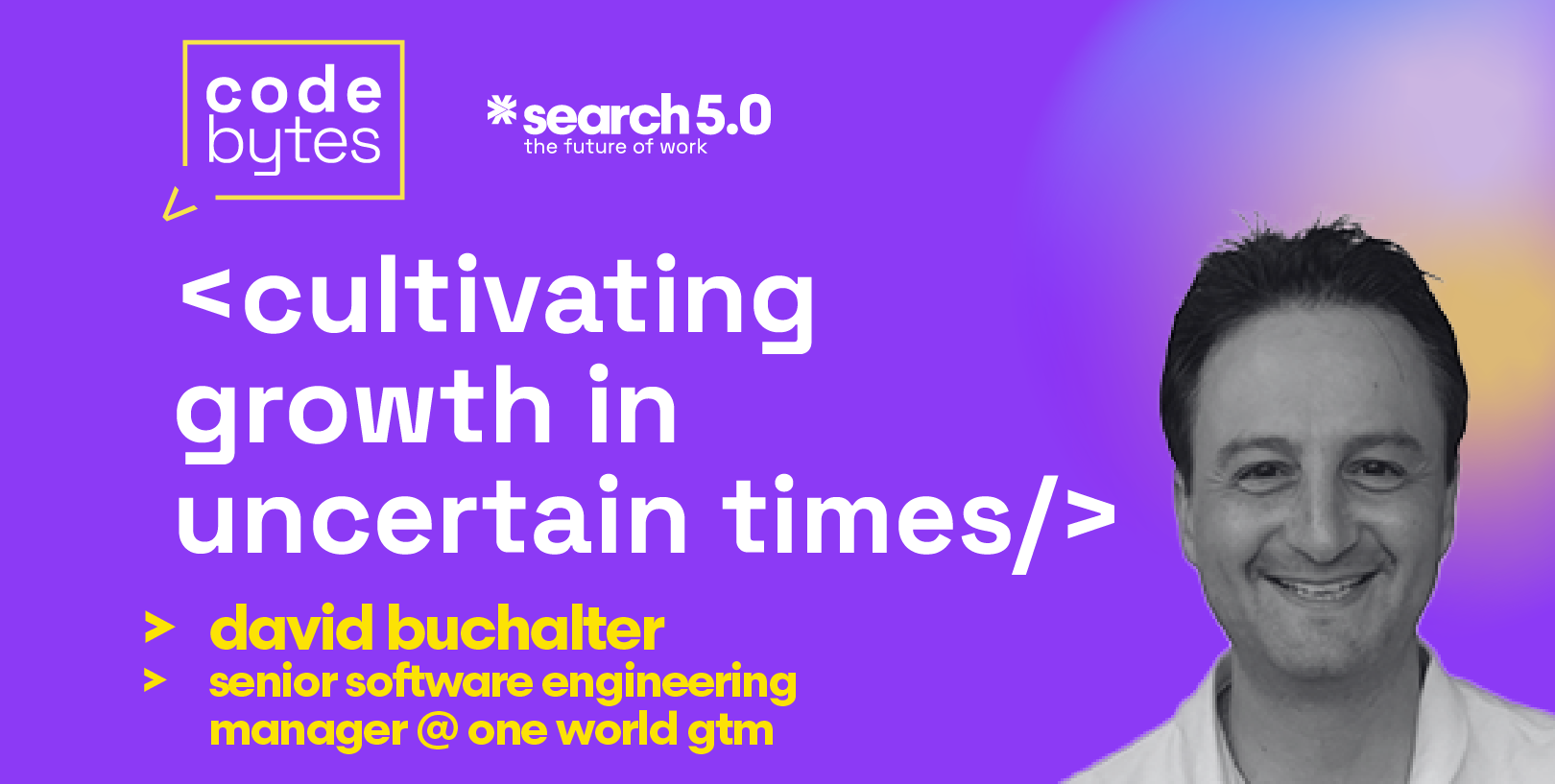
In the latest episode of Code Bytes, host Stephen engages in a captivating discussion with David Buchalter, the Senior Software Engineering Manager at One World GTM. As we explore David's insights, we uncover how to harness the power of mentorship and empathy in leadership roles, the transformative impact of AI in software engineering, and the importance of clear communication in driving team success.
The Importance of Mentorship in Technology Recruitment
The conversation begins with David reflecting on his journey from a software engineer to a leadership role at One World GTM. His experience highlights a significant aspect of technology recruitment in the UK: the vital role mentorship plays in developing talent. David emphasises that effective mentorship is not just about providing guidance but also about creating an environment where individuals feel empowered to grow and share their insights.
As the technology sector continues to evolve, the demand for skilled professionals in roles such as cloud engineering and DevOps, software engineering, and data and AI is at an all-time high. David notes that mentorship can significantly enhance the capabilities of new recruits, helping them navigate the complexities of their roles while contributing meaningfully to their teams. This focus on mentorship is particularly crucial for organisations looking to attract and retain top talent in a competitive job market.
In Northern Ireland, where technology recruitment is gaining momentum, fostering a culture of mentorship can set organisations apart. By investing in their employees’ growth, companies can not only improve job satisfaction but also drive higher performance levels, which is essential for long-term success in technology recruitment.
David believes that a strong mentorship programme can help bridge the skills gap in technology, particularly in areas like cloud engineering and DevOps, where the need for skilled professionals is critical. He highlights that new entrants into the workforce often face challenges in adapting to the fast-paced environment, and having a mentor can provide them with the support they need to overcome these hurdles.
Furthermore, David discusses the importance of establishing a mentoring culture within organisations. He suggests that leaders should actively encourage experienced team members to take on mentorship roles, as this not only aids the development of junior staff but also fosters a sense of community and collaboration. This approach is particularly relevant for technology recruitment in the UK, where the competition for talent is fierce, and companies must leverage every advantage they can to attract and retain top candidates.
Embracing Transformation and Change in Technology
The conversation naturally shifts to the theme of transformation and change within the technology landscape. David highlights how the rapid advancement of technology necessitates a continuous learning mindset. For professionals in technology recruitment, understanding these changes is crucial for identifying the right candidates for contract roles in technology and permanent positions.
David shares his thoughts on how organisations must adapt to the shifting landscape, particularly with the advent of AI tools and methodologies that can streamline processes and improve efficiency. He argues that while AI offers significant advantages, it also requires a fundamental shift in how teams approach their work. Professionals must learn to leverage these tools while maintaining a human touch in their interactions.
David’s insights into transformation and change are particularly relevant in the context of infrastructure and support roles, where the implementation of new technologies can dramatically alter the way teams operate. He explains that leaders must be proactive in identifying emerging trends and technologies, ensuring their teams are equipped to embrace these changes effectively.
The discussion underscores the need for adaptability among technology professionals. David believes that those entering the field today must not only have technical skills but also the ability to pivot and learn new technologies quickly. This adaptability is a key consideration for recruiters looking to fill roles across various sectors, including product development, software engineering, and data management.
David's perspective resonates strongly with the challenges faced by technology recruitment agencies like Search 5.0. As they work to match candidates with the right opportunities, they must stay attuned to industry trends and the evolving needs of employers. This proactive approach to recruitment is essential for success in a market characterised by rapid change and innovation.
The Role of Empathy in Leadership
Throughout the podcast, the importance of empathy in leadership emerges as a central theme. David discusses how empathy can facilitate better communication and collaboration within teams. In an industry characterised by rapid changes and high pressure, leaders who demonstrate empathy are better equipped to support their teams through challenges.
David shares personal anecdotes about how he has applied empathy in his leadership style, creating an environment where team members feel valued and understood. This approach not only fosters a positive workplace culture but also enhances productivity and engagement.
In the context of technology recruitment in Northern Ireland and the broader UK, understanding the importance of empathy can help organisations refine their hiring processes. Recruiters should prioritise finding candidates who possess strong emotional intelligence, as these individuals are more likely to contribute positively to team dynamics and organisational culture.
David points out that empathy is particularly crucial in managing teams during periods of significant change. As organisations implement new technologies or undergo structural shifts, empathetic leaders can help alleviate concerns and provide the support employees need to adapt. This ability to connect with team members on a personal level can make a significant difference in how well a team navigates transformation.
The Intersection of AI and Software Engineering
As the conversation progresses, Stephen and David explore the intersection of AI and software engineering. David notes that while AI is often perceived as a potential threat to jobs, it can also be a powerful ally in enhancing productivity. He encourages professionals to embrace AI as a tool that can assist in various tasks, allowing engineers to focus on more complex and creative aspects of their work.
David's insights into AI are particularly relevant for those pursuing jobs in technology. As the demand for AI proficiency continues to grow, candidates who can demonstrate their ability to work with AI tools will have a distinct advantage in the job market. This is especially true for roles in software engineering, where the integration of AI can lead to significant improvements in efficiency and effectiveness.
David explains that AI has the potential to revolutionise many aspects of software testing and development. By automating routine tasks and providing data-driven insights, AI can enable engineers to concentrate on high-value activities, ultimately driving innovation and quality. For technology recruitment agencies, this presents an exciting opportunity to identify candidates who possess the skills to leverage AI in their work.
However, David also emphasises the importance of maintaining a balance between automation and human oversight. He cautions against over-reliance on AI, reminding listeners that it is crucial to retain the human element in software engineering. Successful professionals must not only understand how to use AI tools but also possess the expertise to make informed decisions based on the insights generated by these technologies.
Building a Strong Personal Brand in Technology
In the latter part of the episode, Stephen and David discuss the importance of building a strong personal brand, particularly on platforms like LinkedIn. David emphasises that candidates should not only focus on their technical skills but also on how they present their experiences and insights to potential employers.
For technology recruitment businesses, helping candidates understand the value of personal branding is essential. A well-crafted LinkedIn profile can significantly enhance a candidate’s visibility and attractiveness to employers, especially in competitive markets like technology recruitment in the UK. David encourages professionals to share their stories, insights, and achievements to create a compelling narrative that resonates with recruiters and hiring managers.
Building a strong personal brand is particularly relevant for those seeking contract roles in technology, as many employers prioritise candidates who can demonstrate their value through a robust online presence. David suggests that job seekers take the time to engage with their professional network, share relevant content, and highlight their unique skills and experiences.
David’s perspective on personal branding also extends to the importance of networking. He advises listeners to cultivate relationships within their industry, as these connections can lead to valuable opportunities and collaborations. By actively engaging with their peers and sharing their knowledge, professionals can enhance their reputation and visibility in the technology sector.
Conclusion: Embracing the Future of Technology Recruitment
The episode concludes with a powerful reminder of the ever-changing nature of the technology landscape. David Buchalter’s insights into mentorship, empathy, and the integration of AI into software engineering provide valuable guidance for both aspiring professionals and seasoned leaders in the field.
As technology recruitment continues to evolve, businesses must remain agile and open to transformation. By prioritising mentorship and empathetic leadership, organisations can cultivate a culture of growth and innovation that attracts top talent.
For those interested in pursuing careers in technology, David’s advice to remain adaptable and continuously learn new skills is paramount. The future of technology recruitment hinges on professionals who can navigate change while leveraging their expertise to drive success in their teams and organisations.




